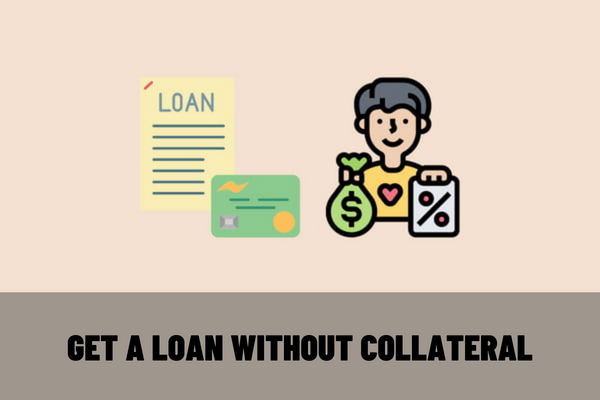Vietnam: Can I get a loan without collateral? Is there a claim for an unsecured loan?
What is an unsecured loan?
An unsecured loan is understood as a debt without collateral in kind. Thus, a debt without any real collateral is called unsecured debt.
In other words, a debt that is not secured by any real assets is called unsecured debt.

Vietnam: Can I get a loan without collateral? Is there a claim for an unsecured loan? (Image from the Internet)
Can I get a loan without collateral?
According to the provisions of Article 463 of the 2015 Civil Code of Vietnam on contracts for loan of property in Vietnam as follows:
Contracts for loan of property in Vietnam
Contract for the loan of property means an agreement between parties whereby a lender delivers property to a borrower. When the loan falls due, the borrower must repay the lender property of the same type in accordance with the correct quantity and quality, and must pay interest if so agreed or so provided by law.
It can be understood that a property loan is an agreement between the parties, the law is not required when borrowing property to have collateral attached, so when there is no collateral, it is still possible to borrow money.
The first choice for property loans is credit institutions, especially banks. The bank is the place where the capital is circulated and the credit activity of the bank is a profitable activity but also the place that contains the most risks. When performing a specific credit activity such as borrowing money, the bank always has to analyze the borrower's factors in the safest way, minimizing risks.
Conditions for banks to accept loans to borrowers without collateral are usually risk analysis through the 6C rules in credit activities which are divided into 2 groups: group of necessary conditions and group of sufficient conditions.
- Group of necessary conditions: being the customer as well as the loan plan has been appraised and assessed by the lending bank as meeting the following conditions: Character; Capacity; Cash Flow; Conditions.
- Group of conditions: Collateral and Control.
Thus, the 6C rule is understood as follows:
- Character is the borrower's status, the borrower's sense and responsibility to repay the loan. This rule confirms the purpose of the loan as well as the viable and legitimate project that will be eligible for a loan.
- Capacity confirms the creditworthiness of the borrower as well as the capacity for civil acts of the customer or the guarantor; legal documents proving the legal capacity of the borrowing enterprise.
- Cash Flow can be understood as the cash flow generated to repay the loan through sales revenue, income from securities issuance, etc. This rule will determine the ability to operate production and business activities and repay loans of customers.
- Conditions are the basis for assessing factors affecting loan solvency through operating results, the borrower's business situation with competitors, sensitivity to business cycles and technological change.
- Collateral is a condition for borrowers to consider lending and is a second source of income to repay loans. Collateral is like a liability of the borrower to the lender in the event that the borrower is unable to repay the loan through the disposal of the collateral to recover the debt.
- Control is the influence of changes in laws and regulations on the borrower's ability to repay the loan.
Of the 6C rules, the rule of collateral is often the least important factor because there are many cases where borrowing property is based on reputation, acquaintances or having reputable assurance from a third party or state agency, etc.
Is there a claim for an unsecured loan?
According to the provisions of Article 466 of the 2015 Civil Code of Vietnam on the obligations of borrowers to repay loans as follows:
Obligations of borrowers to repay loans
1. Where the property lent is a sum of money, the borrower must repay the lender the loan in full when due. If the property is an object, the borrower must deliver to the lender an object of the same type, quantity and quality, unless otherwise agreed.
2. Where a borrower is not able to deliver an object, it may, with the consent of the lender, repay the value of the borrowed object, in cash, as at the time and place of delivery.
3. The place for repayment of a loan shall be the place of residence or head office of the lender, unless otherwise agreed.
4. If a borrower fails to repay all or any instalment of an interest-free loan, in whole or in part, when payment falls due, the borrower must, if the parties so agree, pay interest on the overdue amount from the due date until the date on which payment is made, at the basic interest rate prescribed in Clause 2 Article 468 of this Code, unless otherwise agreed or otherwise prescribed by law.
5. If a borrower fails to repay, in whole or in part, a loan with interest, the borrower must pay:
a) Interest on the principal as agreed in proportion to the overdue loan term and interest at the rate prescribed in Clause 2 Article 468 in case of late payment;
b) Overdue interest on the principal equals one hundred and fifty (150) per cent of the interest rate in proportion to the late payment period, unless otherwise agreed.
Based on the above provisions, the borrower that has borrowed the property must repay the debt when it is due. If payment is not made due to due date, it shall be handled in accordance with law.
LawNet